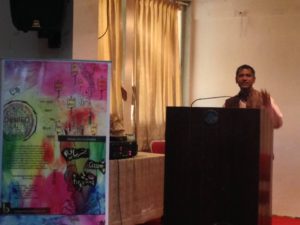
Rahman Abaas at Bebaak Collective
Basant Kumar Mohanty
New Delhi, April 27: The government has withdrawn a controversial clause that asked Urdu writers to declare that their books did not contain anything against the ruling establishment, stepping back in the face of criticism from authors in other languages too.
The human resource development ministry has now asked the National Council for Promotion of Urdu Language, its Urdu promotion body that minister Smriti Irani chairs, to modify a declaration form and do away with the provision that a book is not anti-government.
The modified form – already put out on the council website – has also scrapped another requirement: two witnesses to ratify a writer’s declaration.
The council buys books of bonafide writers under the Bulk Purchase of Books scheme and distributes them among libraries. In a directive last month, it had asked writers who want to submit their books for purchase to fill up a declaration form that their books had nothing against government policies or the nation or any community.
The directive led to public protests over what critics said was an “attack on free speech”. At a meeting in late March, council members too had protested against two of the provisions: that nothing could be written against government policies and the witness clause.
Sources in the council said the ministry last week asked the council to modify the declaration form.
Rahman Abbas, a Mumbai-based Urdu novelist, welcomed the modifications. “I am happy the council has withdrawn clauses which were contradictory to the Constitution of India and were against democratic norms. We welcome it.”
Writers, he added, have no issues with the other two provisions: that books cannot have anything against the nation or anything that could create hatred among communities.
But Urdu writer Ali Javed, who teaches at Delhi University, said he had a problem with the anti-national clause. “Till the government or the council defines what constitutes anti-national, the provision should be put on hold,” Javed said.
He said any piece that was critical of the government to an extent used to be censored during the Emergency and such vague provisions could put restrictions on writers.
Javed said the controversy had led to outrage among writers in all languages. Among those who had openly criticised the council action was well-known Hindi writer Ashok Vajpayee and former Sahitya Akademi secretary K. Satchidanandan, who had quit as an executive council member of the Akademi last year to protest the organisation’ssilence on rising intolerance after the August 2015 murder of award-winning author M.M. Kalburgi.
However, writers, by and large, were happy with the government’s decision. “I think the controversy should be put to rest. The anti-nation clause is all right. It should be prescribed for all books, including private publications,” said Raza Haider, director of the Mirza Ghalib Institute.
The council had earlier decided to consult lawyers on the matter. With the declaration form being modified, council sources said it might not pursue a legal opinion.http://www.telegraphindia.com/1160428/jsp/nation/story_82669.jsp#.VyGOw8dn9uZ
Leave a Reply